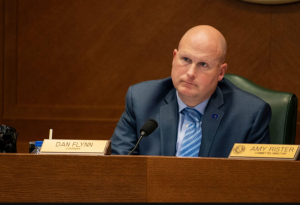In today’s Spotlight on the 87th Legislative Session, we look back on a vote taken by lawmakers in the Texas House of Representatives that would have required record votes on legislation referred to House Committees within 14 days, if requested by lawmakers.
Amendment 10 to HR 4, the House Rules Resolution, brought by Taxpayer Champion State Rep. Tony Tinderholt (R- Arlington) in the 87th legislative session, was another “no brainer” in support of transparency and empowering lawmakers to fight against the (un)official practice of “tagging” bills (a “behind closed doors” practice where committees simply allow legislation they don’t like to die by virtue of the legislative clock, without a vote).

The language of the amendment was very simple and straightforward:
Sec.i____.ii COMMITTEE VOTE REQUIRED ON REQUEST OF AUTHOR OR SPONSOR.
At the request of the primary author or sponsor of a bill or resolution that has been heard at a public hearing of a committee, the chair of the committee shall hold a record vote on whether to favorably report the bill or resolution not later than the earlier of:
(1) the 14th day after the date of the request; or
(2) the last day on which the committee could refer the bill or
resolution to the appropriate calendars committee in sufficient time to allow for
the bill or resolution to be considered for placement on a calendar for second
reading under the deadlines imposed by Rule 8, Section 13.
Lawmakers making decisions on what legislation passes out of committee (and in the case of the Committee on Calendars, deciding what legislation is able to come up for debate on the House floor) is technically part of their jobs. With typically, over 4,000 bills filed every legislative session in the House, there simply is not enough time to deliberate each one, however, a record vote is not something that is all that time-consuming, and routinely happens in the committee process.
The reason that a committee chairman refuses to bring up certain legislation normally has very little to do with time, and more often than not everything to do with protecting committee members from accountability. The problem with the practice of shielding lawmakers from having to take hard votes is that it is an insult to grassroots activists who have advocated for legislative priorities in things like the Republican Party of Texas platform (Many of which are completely ignored by Republican leadership in both legislative chambers). This problem is only amplified by the many committees that are chaired by Democrats or liberal Republicans who are actively opposed to the will of the majority party.
The purpose of this amendment was to provide transparency within the legislative process so that taxpayers know which lawmakers acted to prevent things like conservative priorities from being debated or ultimately considered. The amendment failed and only had 21 House lawmakers in support of it. What does this mean? It means the 122 Nay votes, those who voted against transparency, do not want to be held accountable for their actions in office and actively contributed to the ‘swamp-like’ culture in the Capitol, perpetuating the protection of bad actors that hold office.

Tinderholt has championed this issue in recent legislative sessions and TFR expects that he will likely bring up the issue again in the 88th Legislative Session in 2023. Taxpayers that are planning on voting in the upcoming primary election should take note of lawmakers that actively seek to stifle legislation that would bring much-needed transparency to the Texas legislative process like Amendment 10.
Texas taxpayers should be aware of the tremendous resource made available to them in the Fiscal Responsibility Index. TFR spent hundreds of hours analyzing votes that your lawmakers take and we have condensed them into an easily understandable metric that is available for anyone to use. We recommend you look at how fiscally responsible your lawmaker is before casting your ballot in the upcoming primary election.
Stay tuned, additional spotlights are to come!




